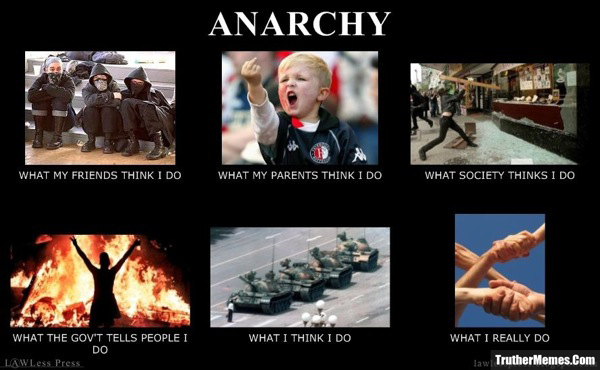Modern media and education definitely do what they can to tarnish the name of a long-standing and rich philosophical tradition. This isn't limited solely to anarchy, many concepts necessary to optimal human flourishing have found themselves ridiculed and marginalized by the agents of the state. Today, though, I want to focus on anarchy (as is the case most days). Easy examples of such “brainwashing” is simply the manner in which the term is used in both “informative” and and entertainment realms of media. The word “anarchy” is rarely uttered, which is not itself indicative of any agenda... but when it is spoken, it is without exception, a pejorative term meant to evoke or describe images of violence, destruction, and criminality. A current example would be the way the media describes the Ferguson riots as “anarchy” while flashing scenes of hundreds of grown men looting a dollar store. In entertainment, only the villain can speak the word without spitting it as if it were a profane and venomous curse. The worst culprits are the news agencies and procedural crime dramas; the news agencies reserve the term for radical combatants or rioters in the third-world or the inner cities of America (but I repeat myself), and the self-described anarchists in the procedurals are always the object of ridicule and often depicted as a villainous caricature of sociopathy.
In education, at least K-12, one is likely to hear the dreaded “A-word” once in all 13 years. That one time is the point when the World War, the result of states' military posturing and nationalistic furor and one of the most devastating events in recorded history, is blamed on the Black Hand, a group of anarchists who killed a politically insignificant duke. The total ignorance of the ways anarchy as a philosophy influenced the American war of independence, the secession of the Confederacy, and the economy of 19th century America, not to mention the history of a greater number of American states is a clear sign that either the history curricula are useless or part of a conspiracy to tell a very specific and pro-state narrative to America's youth. The recent controversies in Jefferson County, CO are actually hinged on this very issue. It is easy to dismiss such a claim as a conspiracy theory and to say I sound just like that crazy guy you saw on Law and Order, CSI, Bones, Criminal Minds, Blue Blood, Cops, America's Most Wanted... but one has to admit that the education system definitely assumes the necessity of institutionalized coercion (laws), theft (taxes), and murder (war, police, etc).
The responses I receive upon coming out of the anarchy closet clearly indicates a cultural reverence for the state. This is puzzling to me, as our government has a 12% approval rating from it's own citizens. I would expect that more people would be open to the suggestion that “maybe the idea of government is inherently flawed” if 82% of Americans disapprove of our particular instance. Especially when taking into account that they simultaneously believe “we are the best nation on earth.” Admittedly, there are a near-infinite number of ways you can structure a government... but the one feature they all have in common is the institutional threat of imprisonment or death to those that do not allow themselves to be robbed or controlled by way of taxation and law enforcement. At the end of the day, all statists agree, whether communist, fascist, republican, democrat, monarchist, or Libertarian, society only flourishes at the business end of a gun. For this reason, the real bad word, which ought to be said with great infrequency and shame is “government”.
How is it that the uptake of freedom-oriented philosophies and movements has not resulted in the reclamation of the word “anarchy”? Well, these philosophies have their own names. With so many agorists, voluntarists, libertarians, capitalists, egoists, and more running around, little attention is paid to anarchy itself anymore. It's a name that has been left for statists to use as a totem for the evils of freedom to ridicule and revile. Besides, doesn't “voluntarism” sound so much more pleasant than “anarchy”? The only problem in thinking such things is, admittedly, a philosophical and intellectual one as opposed to a practical or immediate one.
In order to make a compelling and categorical case for any or all of these ideas, though, one has to understand their philosophical underpinnings. The reality of the matter, in all of its complexity can be glossed in one simple explanation. As I addressed in the last post, anarchy is predicated on a negative philosophical claim: namely the rejection of coercion, theft, and murder as well as institutions which perpetrate such behaviors. These other, nicer sounding, philosophies are predicated on a anarchy first and build a positive claim on top of it. Voluntarism, for example, establishes voluntary association as fundamental to the philosophy.
This may seem like semantic nit-picking, but it is an important distinction to make when trying to establish a strong identity in an inhospitable environment such as that found in the first world. The importance isn't because all the “t”s must be crossed and “i”s dotted, but because all of these positive philosophies of freedom are actually anarchy at their heart, despite their positivist differences. These philosophies, like agorism, are positive assertions built off of the underlying premise of the anarchist principle. So, voluntarism is anarchy + voluntary interaction, or egoism is anarchy + the primacy of the self, or capitalism is anarchy + basic economics, et cetera. In order to best protect ourselves from the war machine of the state, we must learn to get along and collaborate. Doing so is easy if we all realize that we are all anarchists simply building different castles on the same bedrock foundation.
TL; DR: Anarchy isn't a bad word, government is. Freedom-oriented philosophies need to embrace their roots in freedom, rather than obscuring the fact that they are indeed anarchists.



 RSS Feed
RSS Feed
